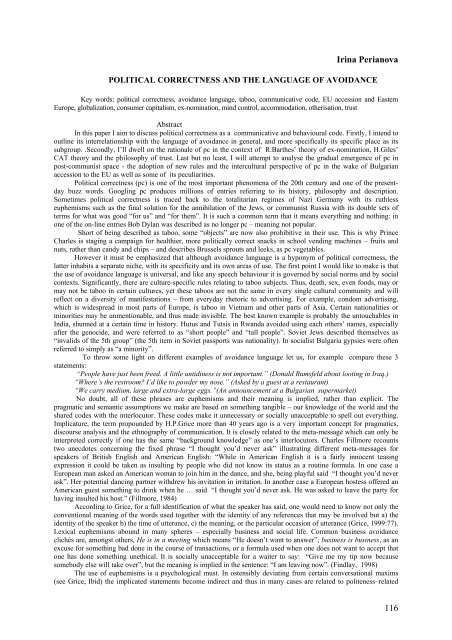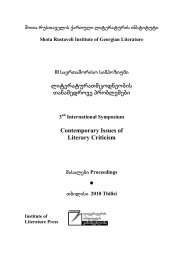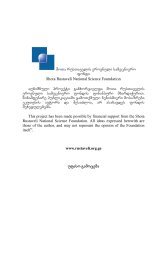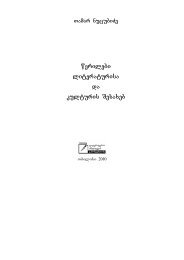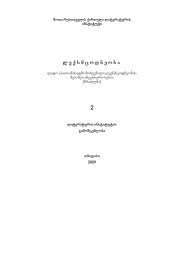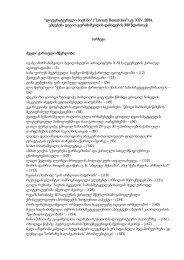Shota Rustaveli Institute of Georgian Literature
Shota Rustaveli Institute of Georgian Literature
Shota Rustaveli Institute of Georgian Literature
You also want an ePaper? Increase the reach of your titles
YUMPU automatically turns print PDFs into web optimized ePapers that Google loves.
Irina Perianova<br />
POLITICAL CORRECTNESS AND THE LANGUAGE OF AVOIDANCE<br />
Key words: political correctness, avoidance language, taboo, communicative code, EU accession and Eastern<br />
Europe, globalization, consumer capitalism, ex-nomination, mind control, accommodation, otherisation, trust<br />
Abstract<br />
In this paper I aim to discuss political correctness as a communicative and behavioural code. Firstly, I intend to<br />
outline its interrelationship with the language <strong>of</strong> avoidance in general, and more specifically its specific place as its<br />
subgroup. .Secondly, I’ll dwell on the rationale <strong>of</strong> pc in the context <strong>of</strong> R.Barthes’ theory <strong>of</strong> ex-nomination, H.Giles’<br />
CAT theory and the philosophy <strong>of</strong> trust. Last but no least, I will attempt to analyse the gradual emergence <strong>of</strong> pc in<br />
post-communist space - the adoption <strong>of</strong> new rules and the intercultural perspective <strong>of</strong> pc in the wake <strong>of</strong> Bulgarian<br />
accession to the EU as well as some <strong>of</strong> its peculiarities.<br />
Political correctness (pc) is one <strong>of</strong> the most important phenomena <strong>of</strong> the 20th century and one <strong>of</strong> the presentday<br />
buzz words. Googling pc produces millions <strong>of</strong> entries referring to its history, philosophy and description.<br />
Sometimes political correctness is traced back to the totalitarian regimes <strong>of</strong> Nazi Germany with its ruthless<br />
euphemisms such as the final solution for the annihilation <strong>of</strong> the Jews, or communist Russia with its double sets <strong>of</strong><br />
terms for what was good “for us” and “for them”. It is such a common term that it means everything and nothing: in<br />
one <strong>of</strong> the on-line entries Bob Dylan was described as no longer pc – meaning not popular.<br />
Short <strong>of</strong> being described as taboo, some “objects” are now also prohibitive in their use. This is why Prince<br />
Charles is staging a campaign for healthier, more politically correct snacks in school vending machines – fruits and<br />
nuts, rather than candy and chips – and describes Brussels sprouts and leeks, as pc vegetables.<br />
However it must be emphasized that although avoidance language is a hyponym <strong>of</strong> political correctness, the<br />
latter inhabits a separate niche, with its specificity and its own areas <strong>of</strong> use. The first point I would like to make is that<br />
the use <strong>of</strong> avoidance language is universal, and like any speech behaviour it is governed by social norms and by social<br />
contexts. Significantly, there are culture-specific rules relating to taboo subjects. Thus, death, sex, even foods, may or<br />
may not be taboo in certain cultures, yet these taboos are not the same in every single cultural community and will<br />
reflect on a diversity <strong>of</strong> manifestations – from everyday rhetoric to advertising. For example, condom advertising,<br />
which is widespread in most parts <strong>of</strong> Europe, is taboo in Vietnam and other parts <strong>of</strong> Asia. Certain nationalities or<br />
minorities may be unmentionable, and thus made invisible. The best known example is probably the untouchables in<br />
India, shunned at a certain time in history. Hutus and Tutsis in Rwanda avoided using each others’ names, especially<br />
after the genocide, and were referred to as “short people” and “tall people”. Soviet Jews described themselves as<br />
“invalids <strong>of</strong> the 5th group” (the 5th item in Soviet passports was nationality). In socialist Bulgaria gypsies were <strong>of</strong>ten<br />
referred to simply as “a minority”.<br />
To throw some light on different examples <strong>of</strong> avoidance language let us, for example compare these 3<br />
statements:<br />
“People have just been freed. A little untidiness is not important.” (Donald Rumsfeld about looting in Iraq.)<br />
“Where’s the restroom? I’d like to powder my nose.” (Asked by a guest at a restaurant)<br />
“We carry medium, large and extra-large eggs.”(An announcement at a Bulgarian supermarket)<br />
No doubt, all <strong>of</strong> these phrases are euphemisms and their meaning is implied, rather than explicit. The<br />
pragmatic and semantic assumptions we make are based on something tangible – our knowledge <strong>of</strong> the world and the<br />
shared codes with the interlocutor. These codes make it unnecessary or socially unacceptable to spell out everything.<br />
Implicature, the term propounded by H.P.Grice more than 40 years ago is a very important concept for pragmatics,<br />
discourse analysis and the ethnography <strong>of</strong> communication. It is closely related to the meta-message which can only be<br />
interpreted correctly if one has the same “background knowledge” as one’s interlocutors. Charles Fillmore recounts<br />
two anecdotes concerning the fixed phrase “I thought you’d never ask” illustrating different meta-messages for<br />
speakers <strong>of</strong> British English and American English: “While in American English it is a fairly innocent teasing<br />
expression it could be taken as insulting by people who did not know its status as a routine formula. In one case a<br />
European man asked an American woman to join him in the dance, and she, being playful said “I thought you’d never<br />
ask”. Her potential dancing partner withdrew his invitation in irritation. In another case a European hostess <strong>of</strong>fered an<br />
American guest something to drink when he … said “I thought you’d never ask. He was asked to leave the party for<br />
having insulted his host.” (Fillmore, 1984)<br />
According to Grice, for a full identification <strong>of</strong> what the speaker has said, one would need to know not only the<br />
conventional meaning <strong>of</strong> the words used together with the identity <strong>of</strong> any references that may be involved but a) the<br />
identity <strong>of</strong> the speaker b) the time <strong>of</strong> utterance, c) the meaning, or the particular occasion <strong>of</strong> utterance (Grice, 1999:77).<br />
Lexical euphemisms abound in many spheres – especially business and social life. Common business avoidance<br />
clichés are, amongst others, He is in a meeting which means “He doesn’t want to answer”; business is business, as an<br />
excuse for something bad done in the course <strong>of</strong> transactions, or a formula used when one does not want to accept that<br />
one has done something unethical. It is socially unacceptable for a waiter to say: “Give me my tip now because<br />
somebody else will take over”, but the meaning is implied in the sentence: “I am leaving now”. (Findlay, 1998)<br />
The use <strong>of</strong> euphemisms is a psychological must. In ostensibly deviating from certain conversational maxims<br />
(see Grice, Ibid) the implicated statements become indirect and thus in many cases are related to politeness–related<br />
116


